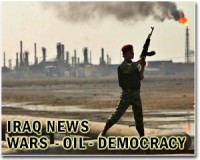 |
Baghdad (AFP) Nov 7, 2010 Nuri al-Maliki, Iraq's uncharismatic but tough-talking prime minister and former rebel, has won a second chance at the premiership eight months after inconclusive elections. After a protracted political standoff that kept the country without a government following the March 7 elections, rival parties reached a power-sharing agreement with Maliki to stay in the top job. Sentenced to death by Saddam Hussein, former guerrilla Maliki, who spent decades in exile, emerged from the shadows in 2006 to take the reins of Iraq's first permanent post-Saddam government. In October, Iraq's main Shiite parliamentary bloc, the National Alliance, chose Maliki as its candidate for the premiership in a move aimed at breaking the deadlock over forming a government that followed the March polls. Maliki's State of Law Alliance came second in the election, two seats behind the Iraqiya bloc of fellow Shiite and former premier Iyad Allawi, but neither had the 163 seats needed for a majority to form a government on its own. After the election, Maliki joined forces with the Iraqi National Alliance, a coalition of Shiite religious groups, to form the National Alliance (NA). A dour-looking politician who is rarely seen smiling in public, Maliki has forged a reputation as a strong leader who can impose stability on war-ravaged Iraq. Sectarian violence has been the toughest and most brutal challenge to Maliki's grip on power since he took over the helm of Iraq's first permanent post-invasion government in May 2006. Blunt and uncharismatic, he faced down accusations of sectarianism for not tackling Shiite militias in 2007 in defiance of crumbling support at home and abroad. Former US president George W. Bush has described Maliki as "a good guy, a good man with a difficult job." Maliki was born in 1950 in the predominantly Shiite central province of Babil. He joined the Shiite Islamic Dawa Party -- the oldest Iraqi movement opposed to Saddam -- while at university where he gained an MA in Arabic literature. Maliki fled Iraq in 1979 after Saddam banned the party, and Dawa says that he was later sentenced to death in absentia. From 1980 onwards, he lived in Iran and then Syria where he edited Dawa's newspaper. Around that time he also assumed the nom-de-guerre Jawad and began coordinating cross-border raids from Iran into Iraq. Maliki returned to Iraq after the US-led invasion of 2003 and became a member of the de-Baathification commission that removed Saddam supporters from public office. In 2006, the owlish, suit-wearing and bespectacled Maliki was named premier after his predecessor Ibrahim al-Jaafari met stiff opposition from Sunnis and Kurds who regarded him as being too sectarian. At the time, violence was raging throughout Iraq, with thousands of people killed in intercommunal bloodshed. In 2008, Maliki pursued an offensive against the Mahdi Army militia of radical Shiite cleric Moqtada al-Sadr, winning plaudits for his apparent willingness to set aside communal interests for a nationalist agenda. While violence has dropped dramatically since its peak in 2006 and 2007, something Maliki has been quick to take credit for, analysts note that much of the decline had to do with a strengthened US troop presence and the co-opting of Sunni tribal groups to fight Al-Qaeda. In January 2009, Maliki allies campaigned under his State of Law banner and performed well in provincial elections. Under his tenure the American military ended combat operations in Iraq at the end of August, keeping about 50,000 troops in the country to advise and assist the Iraqi authorities. However, last month he came under renewed pressure as US military documents revealed by WikiLeaks included allegations of state-sanctioned torture under Maliki and alleged links to "death squads." burs/hkb/srm
Share This Article With Planet Earth
Related Links Iraq: The first technology war of the 21st century
 Turkey urges Iraq roundtable meet to form govt
Turkey urges Iraq roundtable meet to form govtArbil, Iraq (AFP) Nov 7, 2010 Turkey's foreign minister called Sunday for a meeting of all Iraqi political groups on forming a government, as he visited the Kurdish north exactly eight months since Iraq's inconclusive election. "We hope to soon see all Iraqi ethnic and political groups gathered around a table to pave the way for the formation of a government in this country," Ahmet Davutoglu said in Arbil, the capital of ... read more |
|
| The content herein, unless otherwise known to be public domain, are Copyright 1995-2010 - SpaceDaily. AFP and UPI Wire Stories are copyright Agence France-Presse and United Press International. ESA Portal Reports are copyright European Space Agency. All NASA sourced material is public domain. Additional copyrights may apply in whole or part to other bona fide parties. Advertising does not imply endorsement,agreement or approval of any opinions, statements or information provided by SpaceDaily on any Web page published or hosted by SpaceDaily. Privacy Statement |